* spelling: activity Signed-off-by: Josh Soref <jsoref@users.noreply.github.com> * spelling: adding Signed-off-by: Josh Soref <jsoref@users.noreply.github.com> * spelling: addresses Signed-off-by: Josh Soref <jsoref@users.noreply.github.com> * spelling: administrators Signed-off-by: Josh Soref <jsoref@users.noreply.github.com> * spelling: alarm Signed-off-by: Josh Soref <jsoref@users.noreply.github.com> * spelling: alignment Signed-off-by: Josh Soref <jsoref@users.noreply.github.com> * spelling: analyzing Signed-off-by: Josh Soref <jsoref@users.noreply.github.com> * spelling: apcupsd Signed-off-by: Josh Soref <jsoref@users.noreply.github.com> * spelling: apply Signed-off-by: Josh Soref <jsoref@users.noreply.github.com> * spelling: around Signed-off-by: Josh Soref <jsoref@users.noreply.github.com> * spelling: associated Signed-off-by: Josh Soref <jsoref@users.noreply.github.com> * spelling: automatically Signed-off-by: Josh Soref <jsoref@users.noreply.github.com> * spelling: availability Signed-off-by: Josh Soref <jsoref@users.noreply.github.com> * spelling: background Signed-off-by: Josh Soref <jsoref@users.noreply.github.com> * spelling: bandwidth Signed-off-by: Josh Soref <jsoref@users.noreply.github.com> * spelling: berkeley Signed-off-by: Josh Soref <jsoref@users.noreply.github.com> * spelling: between Signed-off-by: Josh Soref <jsoref@users.noreply.github.com> * spelling: celsius Signed-off-by: Josh Soref <jsoref@users.noreply.github.com> * spelling: centos Signed-off-by: Josh Soref <jsoref@users.noreply.github.com> * spelling: certificate Signed-off-by: Josh Soref <jsoref@users.noreply.github.com> * spelling: cockroach Signed-off-by: Josh Soref <jsoref@users.noreply.github.com> * spelling: collectors Signed-off-by: Josh Soref <jsoref@users.noreply.github.com> * spelling: concatenation Signed-off-by: Josh Soref <jsoref@users.noreply.github.com> * spelling: configuration Signed-off-by: Josh Soref <jsoref@users.noreply.github.com> * spelling: configured Signed-off-by: Josh Soref <jsoref@users.noreply.github.com> * spelling: continuous Signed-off-by: Josh Soref <jsoref@users.noreply.github.com> * spelling: correctly Signed-off-by: Josh Soref <jsoref@users.noreply.github.com> * spelling: corresponding Signed-off-by: Josh Soref <jsoref@users.noreply.github.com> * spelling: cyberpower Signed-off-by: Josh Soref <jsoref@users.noreply.github.com> * spelling: daemon Signed-off-by: Josh Soref <jsoref@users.noreply.github.com> * spelling: dashboard Signed-off-by: Josh Soref <jsoref@users.noreply.github.com> * spelling: database Signed-off-by: Josh Soref <jsoref@users.noreply.github.com> * spelling: deactivating Signed-off-by: Josh Soref <jsoref@users.noreply.github.com> * spelling: dependencies Signed-off-by: Josh Soref <jsoref@users.noreply.github.com> * spelling: deployment Signed-off-by: Josh Soref <jsoref@users.noreply.github.com> * spelling: determine Signed-off-by: Josh Soref <jsoref@users.noreply.github.com> * spelling: downloading Signed-off-by: Josh Soref <jsoref@users.noreply.github.com> * spelling: either Signed-off-by: Josh Soref <jsoref@users.noreply.github.com> * spelling: electric Signed-off-by: Josh Soref <jsoref@users.noreply.github.com> * spelling: entity Signed-off-by: Josh Soref <jsoref@users.noreply.github.com> * spelling: entrant Signed-off-by: Josh Soref <jsoref@users.noreply.github.com> * spelling: enumerating Signed-off-by: Josh Soref <jsoref@users.noreply.github.com> * spelling: environment Signed-off-by: Josh Soref <jsoref@users.noreply.github.com> * spelling: equivalent Signed-off-by: Josh Soref <jsoref@users.noreply.github.com> * spelling: etsy Signed-off-by: Josh Soref <jsoref@users.noreply.github.com> * spelling: everything Signed-off-by: Josh Soref <jsoref@users.noreply.github.com> * spelling: examining Signed-off-by: Josh Soref <jsoref@users.noreply.github.com> * spelling: expectations Signed-off-by: Josh Soref <jsoref@users.noreply.github.com> * spelling: explicit Signed-off-by: Josh Soref <jsoref@users.noreply.github.com> * spelling: explicitly Signed-off-by: Josh Soref <jsoref@users.noreply.github.com> * spelling: finally Signed-off-by: Josh Soref <jsoref@users.noreply.github.com> * spelling: flexible Signed-off-by: Josh Soref <jsoref@users.noreply.github.com> * spelling: further Signed-off-by: Josh Soref <jsoref@users.noreply.github.com> * spelling: hddtemp Signed-off-by: Josh Soref <jsoref@users.noreply.github.com> * spelling: humidity Signed-off-by: Josh Soref <jsoref@users.noreply.github.com> * spelling: identify Signed-off-by: Josh Soref <jsoref@users.noreply.github.com> * spelling: importance Signed-off-by: Josh Soref <jsoref@users.noreply.github.com> * spelling: incoming Signed-off-by: Josh Soref <jsoref@users.noreply.github.com> * spelling: individual Signed-off-by: Josh Soref <jsoref@users.noreply.github.com> * spelling: initiate Signed-off-by: Josh Soref <jsoref@users.noreply.github.com> * spelling: installation Signed-off-by: Josh Soref <jsoref@users.noreply.github.com> * spelling: integration Signed-off-by: Josh Soref <jsoref@users.noreply.github.com> * spelling: integrity Signed-off-by: Josh Soref <jsoref@users.noreply.github.com> * spelling: involuntary Signed-off-by: Josh Soref <jsoref@users.noreply.github.com> * spelling: issues Signed-off-by: Josh Soref <jsoref@users.noreply.github.com> * spelling: kernel Signed-off-by: Josh Soref <jsoref@users.noreply.github.com> * spelling: language Signed-off-by: Josh Soref <jsoref@users.noreply.github.com> * spelling: libwebsockets Signed-off-by: Josh Soref <jsoref@users.noreply.github.com> * spelling: lighttpd Signed-off-by: Josh Soref <jsoref@users.noreply.github.com> * spelling: maintained Signed-off-by: Josh Soref <jsoref@users.noreply.github.com> * spelling: meaningful Signed-off-by: Josh Soref <jsoref@users.noreply.github.com> * spelling: memory Signed-off-by: Josh Soref <jsoref@users.noreply.github.com> * spelling: metrics Signed-off-by: Josh Soref <jsoref@users.noreply.github.com> * spelling: miscellaneous Signed-off-by: Josh Soref <jsoref@users.noreply.github.com> * spelling: monitoring Signed-off-by: Josh Soref <jsoref@users.noreply.github.com> * spelling: monitors Signed-off-by: Josh Soref <jsoref@users.noreply.github.com> * spelling: monolithic Signed-off-by: Josh Soref <jsoref@users.noreply.github.com> * spelling: multi Signed-off-by: Josh Soref <jsoref@users.noreply.github.com> * spelling: multiplier Signed-off-by: Josh Soref <jsoref@users.noreply.github.com> * spelling: navigation Signed-off-by: Josh Soref <jsoref@users.noreply.github.com> * spelling: noisy Signed-off-by: Josh Soref <jsoref@users.noreply.github.com> * spelling: number Signed-off-by: Josh Soref <jsoref@users.noreply.github.com> * spelling: observing Signed-off-by: Josh Soref <jsoref@users.noreply.github.com> * spelling: omitted Signed-off-by: Josh Soref <jsoref@users.noreply.github.com> * spelling: orchestrator Signed-off-by: Josh Soref <jsoref@users.noreply.github.com> * spelling: overall Signed-off-by: Josh Soref <jsoref@users.noreply.github.com> * spelling: overridden Signed-off-by: Josh Soref <jsoref@users.noreply.github.com> * spelling: package Signed-off-by: Josh Soref <jsoref@users.noreply.github.com> * spelling: packages Signed-off-by: Josh Soref <jsoref@users.noreply.github.com> * spelling: packet Signed-off-by: Josh Soref <jsoref@users.noreply.github.com> * spelling: pages Signed-off-by: Josh Soref <jsoref@users.noreply.github.com> * spelling: parameter Signed-off-by: Josh Soref <jsoref@users.noreply.github.com> * spelling: parsable Signed-off-by: Josh Soref <jsoref@users.noreply.github.com> * spelling: percentage Signed-off-by: Josh Soref <jsoref@users.noreply.github.com> * spelling: perfect Signed-off-by: Josh Soref <jsoref@users.noreply.github.com> * spelling: phpfpm Signed-off-by: Josh Soref <jsoref@users.noreply.github.com> * spelling: platform Signed-off-by: Josh Soref <jsoref@users.noreply.github.com> * spelling: preferred Signed-off-by: Josh Soref <jsoref@users.noreply.github.com> * spelling: prioritize Signed-off-by: Josh Soref <jsoref@users.noreply.github.com> * spelling: probabilities Signed-off-by: Josh Soref <jsoref@users.noreply.github.com> * spelling: process Signed-off-by: Josh Soref <jsoref@users.noreply.github.com> * spelling: processes Signed-off-by: Josh Soref <jsoref@users.noreply.github.com> * spelling: program Signed-off-by: Josh Soref <jsoref@users.noreply.github.com> * spelling: qos Signed-off-by: Josh Soref <jsoref@users.noreply.github.com> * spelling: quick Signed-off-by: Josh Soref <jsoref@users.noreply.github.com> * spelling: raspberry Signed-off-by: Josh Soref <jsoref@users.noreply.github.com> * spelling: received Signed-off-by: Josh Soref <jsoref@users.noreply.github.com> * spelling: recvfile Signed-off-by: Josh Soref <jsoref@users.noreply.github.com> * spelling: red hat Signed-off-by: Josh Soref <jsoref@users.noreply.github.com> * spelling: relatively Signed-off-by: Josh Soref <jsoref@users.noreply.github.com> * spelling: reliability Signed-off-by: Josh Soref <jsoref@users.noreply.github.com> * spelling: repository Signed-off-by: Josh Soref <jsoref@users.noreply.github.com> * spelling: requested Signed-off-by: Josh Soref <jsoref@users.noreply.github.com> * spelling: requests Signed-off-by: Josh Soref <jsoref@users.noreply.github.com> * spelling: retrieved Signed-off-by: Josh Soref <jsoref@users.noreply.github.com> * spelling: scenarios Signed-off-by: Josh Soref <jsoref@users.noreply.github.com> * spelling: see all Signed-off-by: Josh Soref <jsoref@users.noreply.github.com> * spelling: supported Signed-off-by: Josh Soref <jsoref@users.noreply.github.com> * spelling: supports Signed-off-by: Josh Soref <jsoref@users.noreply.github.com> * spelling: temporary Signed-off-by: Josh Soref <jsoref@users.noreply.github.com> * spelling: tsdb Signed-off-by: Josh Soref <jsoref@users.noreply.github.com> * spelling: tutorial Signed-off-by: Josh Soref <jsoref@users.noreply.github.com> * spelling: updates Signed-off-by: Josh Soref <jsoref@users.noreply.github.com> * spelling: utilization Signed-off-by: Josh Soref <jsoref@users.noreply.github.com> * spelling: value Signed-off-by: Josh Soref <jsoref@users.noreply.github.com> * spelling: variables Signed-off-by: Josh Soref <jsoref@users.noreply.github.com> * spelling: visualize Signed-off-by: Josh Soref <jsoref@users.noreply.github.com> * spelling: voluntary Signed-off-by: Josh Soref <jsoref@users.noreply.github.com> * spelling: your Signed-off-by: Josh Soref <jsoref@users.noreply.github.com>
300 lines
17 KiB
Markdown
300 lines
17 KiB
Markdown
<!--
|
|
title: Monitor any process in real-time with Netdata
|
|
description: "Tap into Netdata's powerful collectors, with per-second utilization metrics for every process, to troubleshoot faster and make data-informed decisions."
|
|
image: /img/seo/guides/monitor/process.png
|
|
custom_edit_url: https://github.com/netdata/netdata/edit/master/docs/guides/monitor/process.md
|
|
-->
|
|
|
|
# Monitor any process in real-time with Netdata
|
|
|
|
Netdata is more than a multitude of generic system-level metrics and visualizations. Instead of providing only a bird's
|
|
eye view of your system, leaving you to wonder exactly _what_ is taking up 99% CPU, Netdata also gives you visibility
|
|
into _every layer_ of your node. These additional layers give you context, and meaningful insights, into the true health
|
|
and performance of your infrastructure.
|
|
|
|
One of these layers is the _process_. Every time a Linux system runs a program, it creates an independent process that
|
|
executes the program's instructions in parallel with anything else happening on the system. Linux systems track the
|
|
state and resource utilization of processes using the [`/proc` filesystem](https://en.wikipedia.org/wiki/Procfs), and
|
|
Netdata is designed to hook into those metrics to create meaningful visualizations out of the box.
|
|
|
|
While there are a lot of existing command-line tools for tracking processes on Linux systems, such as `ps` or `top`,
|
|
only Netdata provides dozens of real-time charts, at both per-second and event frequency, without you having to write
|
|
SQL queries or know a bunch of arbitrary command-line flags.
|
|
|
|
With Netdata's process monitoring, you can:
|
|
|
|
- Benchmark/optimize performance of standard applications, like web servers or databases
|
|
- Benchmark/optimize performance of custom applications
|
|
- Troubleshoot CPU/memory/disk utilization issues (why is my system's CPU spiking right now?)
|
|
- Perform granular capacity planning based on the specific needs of your infrastructure
|
|
- Search for leaking file descriptors
|
|
- Investigate zombie processes
|
|
|
|
... and much more. Let's get started.
|
|
|
|
## Prerequisites
|
|
|
|
- One or more Linux nodes running the [Netdata Agent](/docs/get/README.md). If you need more time to understand
|
|
Netdata before following this guide, see the [infrastructure](/docs/quickstart/infrastructure.md) or
|
|
[single-node](/docs/quickstart/single-node.md) monitoring quickstarts.
|
|
- A general understanding of how to [configure the Netdata Agent](/docs/configure/nodes.md) using `edit-config`.
|
|
- A Netdata Cloud account. [Sign up](https://app.netdata.cloud) if you don't have one already.
|
|
|
|
## How does Netdata do process monitoring?
|
|
|
|
The Netdata Agent already knows to look for hundreds of [standard applications that we support via
|
|
collectors](/collectors/COLLECTORS.md), and groups them based on their purpose. Let's say you want to monitor a MySQL
|
|
database using its process. The Netdata Agent already knows to look for processes with the string `mysqld` in their
|
|
name, along with a few others, and puts them into the `sql` group. This `sql` group then becomes a dimension in all
|
|
process-specific charts.
|
|
|
|
The process and groups settings are used by two unique and powerful collectors.
|
|
|
|
[**`apps.plugin`**](/collectors/apps.plugin/README.md) looks at the Linux process tree every second, much like `top` or
|
|
`ps fax`, and collects resource utilization information on every running process. It then automatically adds a layer of
|
|
meaningful visualization on top of these metrics, and creates per-process/application charts.
|
|
|
|
[**`ebpf.plugin`**](/collectors/ebpf.plugin/README.md): Netdata's extended Berkeley Packet Filter (eBPF) collector
|
|
monitors Linux kernel-level metrics for file descriptors, virtual filesystem IO, and process management, and then hands
|
|
process-specific metrics over to `apps.plugin` for visualization. The eBPF collector also collects and visualizes
|
|
metrics on an _event frequency_, which means it captures every kernel interaction, and not just the volume of
|
|
interaction at every second in time. That's even more precise than Netdata's standard per-second granularity.
|
|
|
|
### Per-process metrics and charts in Netdata
|
|
|
|
With these collectors working in parallel, Netdata visualizes the following per-second metrics for _any_ process on your
|
|
Linux systems:
|
|
|
|
- CPU utilization (`apps.cpu`)
|
|
- Total CPU usage
|
|
- User/system CPU usage (`apps.cpu_user`/`apps.cpu_system`)
|
|
- Disk I/O
|
|
- Physical reads/writes (`apps.preads`/`apps.pwrites`)
|
|
- Logical reads/writes (`apps.lreads`/`apps.lwrites`)
|
|
- Open unique files (if a file is found open multiple times, it is counted just once, `apps.files`)
|
|
- Memory
|
|
- Real Memory Used (non-shared, `apps.mem`)
|
|
- Virtual Memory Allocated (`apps.vmem`)
|
|
- Minor page faults (i.e. memory activity, `apps.minor_faults`)
|
|
- Processes
|
|
- Threads running (`apps.threads`)
|
|
- Processes running (`apps.processes`)
|
|
- Carried over uptime (since the last Netdata Agent restart, `apps.uptime`)
|
|
- Minimum uptime (`apps.uptime_min`)
|
|
- Average uptime (`apps.uptime_average`)
|
|
- Maximum uptime (`apps.uptime_max`)
|
|
- Pipes open (`apps.pipes`)
|
|
- Swap memory
|
|
- Swap memory used (`apps.swap`)
|
|
- Major page faults (i.e. swap activity, `apps.major_faults`)
|
|
- Network
|
|
- Sockets open (`apps.sockets`)
|
|
- eBPF file
|
|
- Number of calls to open files. (`apps.file_open`)
|
|
- Number of files closed. (`apps.file_closed`)
|
|
- Number of calls to open files that returned errors.
|
|
- Number of calls to close files that returned errors.
|
|
- eBPF syscall
|
|
- Number of calls to delete files. (`apps.file_deleted`)
|
|
- Number of calls to `vfs_write`. (`apps.vfs_write_call`)
|
|
- Number of calls to `vfs_read`. (`apps.vfs_read_call`)
|
|
- Number of bytes written with `vfs_write`. (`apps.vfs_write_bytes`)
|
|
- Number of bytes read with `vfs_read`. (`apps.vfs_read_bytes`)
|
|
- Number of calls to write a file that returned errors.
|
|
- Number of calls to read a file that returned errors.
|
|
- eBPF process
|
|
- Number of process created with `do_fork`. (`apps.process_create`)
|
|
- Number of threads created with `do_fork` or `__x86_64_sys_clone`, depending on your system's kernel version. (`apps.thread_create`)
|
|
- Number of times that a process called `do_exit`. (`apps.task_close`)
|
|
- eBPF net
|
|
- Number of bytes sent. (`apps.bandwidth_sent`)
|
|
- Number of bytes received. (`apps.bandwidth_recv`)
|
|
|
|
As an example, here's the per-process CPU utilization chart, including a `sql` group/dimension.
|
|
|
|
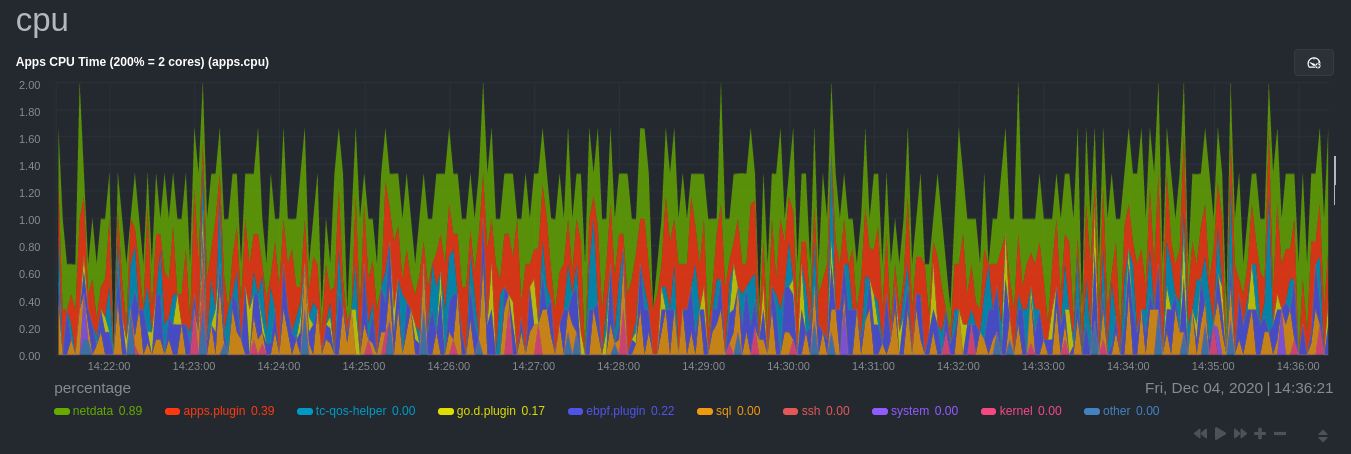
|
|
|
|
## Configure the Netdata Agent to recognize a specific process
|
|
|
|
To monitor any process, you need to make sure the Netdata Agent is aware of it. As mentioned above, the Agent is already
|
|
aware of hundreds of processes, and collects metrics from them automatically.
|
|
|
|
But, if you want to change the grouping behavior, add an application that isn't yet supported in the Netdata Agent, or
|
|
monitor a custom application, you need to edit the `apps_groups.conf` configuration file.
|
|
|
|
Navigate to your [Netdata config directory](/docs/configure/nodes.md) and use `edit-config` to edit the file.
|
|
|
|
```bash
|
|
cd /etc/netdata # Replace this with your Netdata config directory if not at /etc/netdata.
|
|
sudo ./edit-config apps_groups.conf
|
|
```
|
|
|
|
Inside the file are lists of process names, oftentimes using wildcards (`*`), that the Netdata Agent looks for and
|
|
groups together. For example, the Netdata Agent looks for processes starting with `mysqld`, `mariad`, `postgres`, and
|
|
others, and groups them into `sql`. That makes sense, since all these processes are for SQL databases.
|
|
|
|
```conf
|
|
sql: mysqld* mariad* postgres* postmaster* oracle_* ora_* sqlservr
|
|
```
|
|
|
|
These groups are then reflected as [dimensions](/web/README.md#dimensions) within Netdata's charts.
|
|
|
|
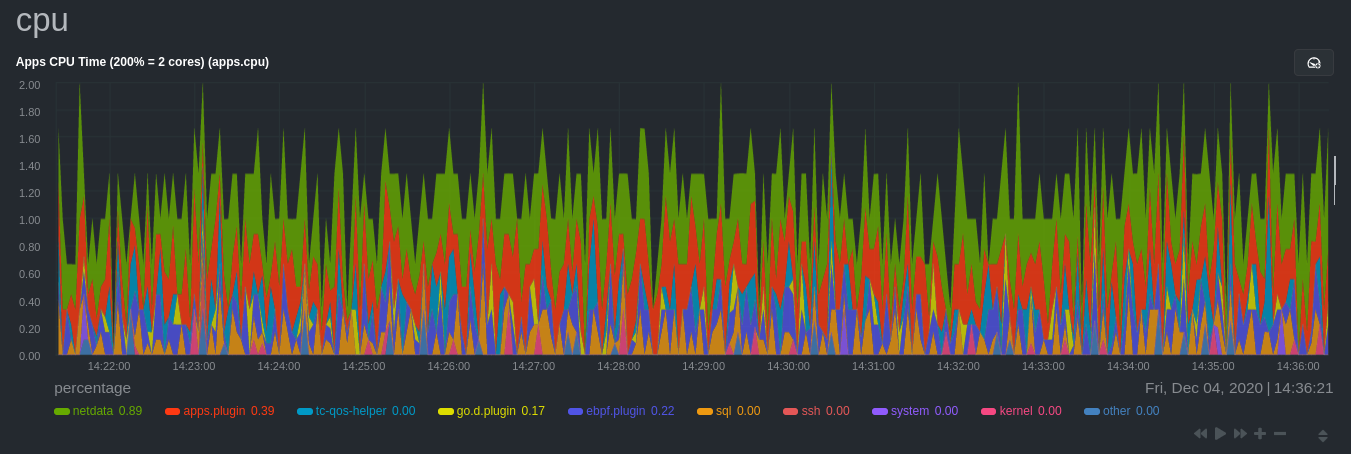
|
|
|
|
See the following two sections for details based on your needs. If you don't need to configure `apps_groups.conf`, jump
|
|
down to [visualizing process metrics](#visualize-process-metrics).
|
|
|
|
### Standard applications (web servers, databases, containers, and more)
|
|
|
|
As explained above, the Netdata Agent is already aware of most standard applications you run on Linux nodes, and you
|
|
shouldn't need to configure it to discover them.
|
|
|
|
However, if you're using multiple applications that the Netdata Agent groups together you may want to separate them for
|
|
more precise monitoring. If you're not running any other types of SQL databases on that node, you don't need to change
|
|
the grouping, since you know that any MySQL is the only process contributing to the `sql` group.
|
|
|
|
Let's say you're using both MySQL and PostgreSQL databases on a single node, and want to monitor their processes
|
|
independently. Open the `apps_groups.conf` file as explained in the [section
|
|
above](#configure-the-netdata-agent-to-recognize-a-specific-process) and scroll down until you find the `database
|
|
servers` section. Create new groups for MySQL and PostgreSQL, and move their process queries into the unique groups.
|
|
|
|
```conf
|
|
# -----------------------------------------------------------------------------
|
|
# database servers
|
|
|
|
mysql: mysqld*
|
|
postgres: postgres*
|
|
sql: mariad* postmaster* oracle_* ora_* sqlservr
|
|
```
|
|
|
|
Restart Netdata with `service netdata restart`, or the appropriate method for your system, to start collecting
|
|
utilization metrics from your application. Time to [visualize your process metrics](#visualize-process-metrics).
|
|
|
|
### Custom applications
|
|
|
|
Let's assume you have an application that runs on the process `custom-app`. To monitor eBPF metrics for that application
|
|
separate from any others, you need to create a new group in `apps_groups.conf` and associate that process name with it.
|
|
|
|
Open the `apps_groups.conf` file as explained in the [section
|
|
above](#configure-the-netdata-agent-to-recognize-a-specific-process). Scroll down to `# NETDATA processes accounting`.
|
|
Above that, paste in the following text, which creates a new `custom-app` group with the `custom-app` process. Replace
|
|
`custom-app` with the name of your application's Linux process. `apps_groups.conf` should now look like this:
|
|
|
|
```conf
|
|
...
|
|
# -----------------------------------------------------------------------------
|
|
# Custom applications to monitor with apps.plugin and ebpf.plugin
|
|
|
|
custom-app: custom-app
|
|
|
|
# -----------------------------------------------------------------------------
|
|
# NETDATA processes accounting
|
|
...
|
|
```
|
|
|
|
Restart Netdata with `service netdata restart`, or the appropriate method for your system, to start collecting
|
|
utilization metrics from your application.
|
|
|
|
## Visualize process metrics
|
|
|
|
Now that you're collecting metrics for your process, you'll want to visualize them using Netdata's real-time,
|
|
interactive charts. Find these visualizations in the same section regardless of whether you use [Netdata
|
|
Cloud](https://app.netdata.cloud) for infrastructure monitoring, or single-node monitoring with the local Agent's
|
|
dashboard at `http://localhost:19999`.
|
|
|
|
If you need a refresher on all the available per-process charts, see the [above
|
|
list](#per-process-metrics-and-charts-in-netdata).
|
|
|
|
### Using Netdata's application collector (`apps.plugin`)
|
|
|
|
`apps.plugin` puts all of its charts under the **Applications** section of any Netdata dashboard.
|
|
|
|
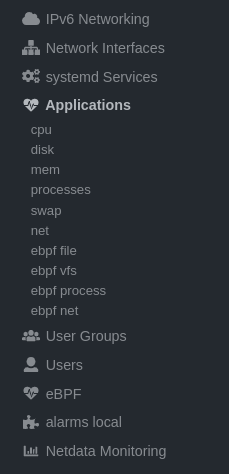
|
|
|
|
Let's continue with the MySQL example. We can create a [test
|
|
database](https://www.digitalocean.com/community/tutorials/how-to-measure-mysql-query-performance-with-mysqlslap) in
|
|
MySQL to generate load on the `mysql` process.
|
|
|
|
`apps.plugin` immediately collects and visualizes this activity `apps.cpu` chart, which shows an increase in CPU
|
|
utilization from the `sql` group. There is a parallel increase in `apps.pwrites`, which visualizes writes to disk.
|
|
|
|
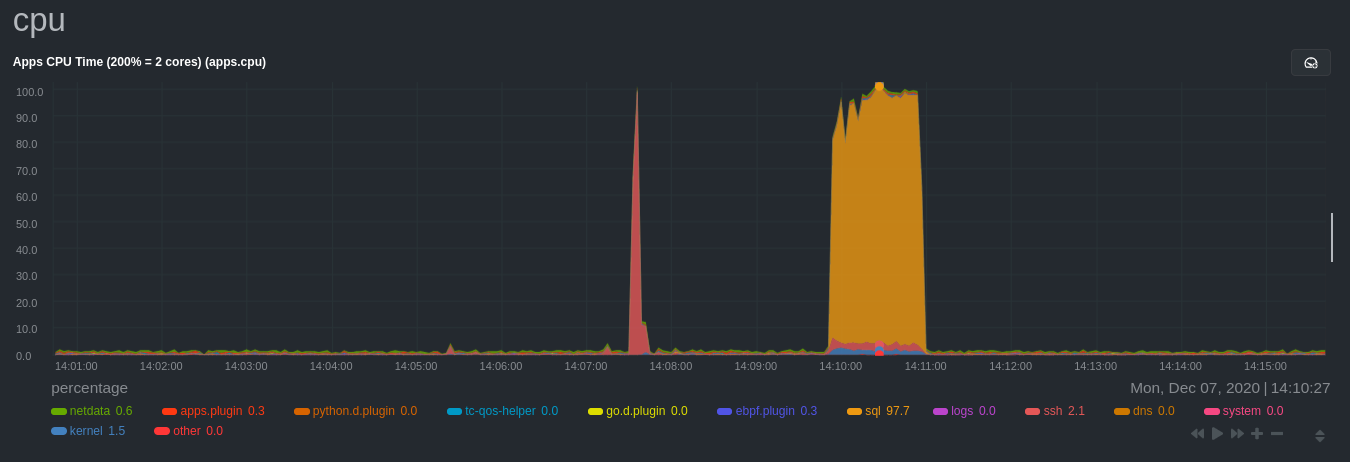
|
|
|
|
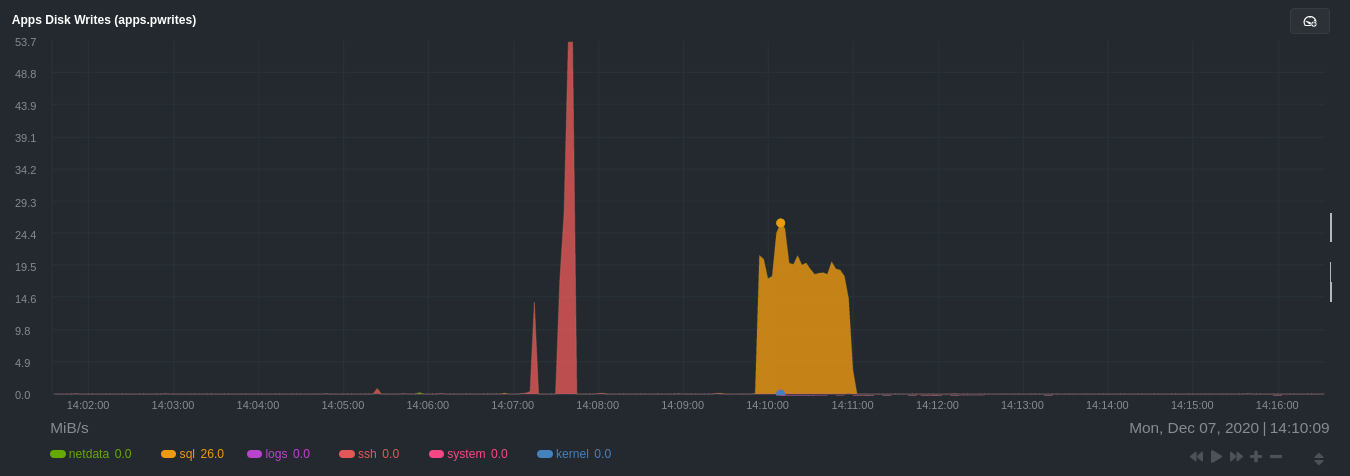
|
|
|
|
Next, the `mysqlslap` utility queries the database to provide some benchmarking load on the MySQL database. It won't
|
|
look exactly like a production database executing lots of user queries, but it gives you an idea into the possibility of
|
|
these visualizations.
|
|
|
|
```bash
|
|
sudo mysqlslap --user=sysadmin --password --host=localhost --concurrency=50 --iterations=10 --create-schema=employees --query="SELECT * FROM dept_emp;" --verbose
|
|
```
|
|
|
|
The following per-process disk utilization charts show spikes under the `sql` group at the same time `mysqlslap` was run
|
|
numerous times, with slightly different concurrency and query options.
|
|
|
|
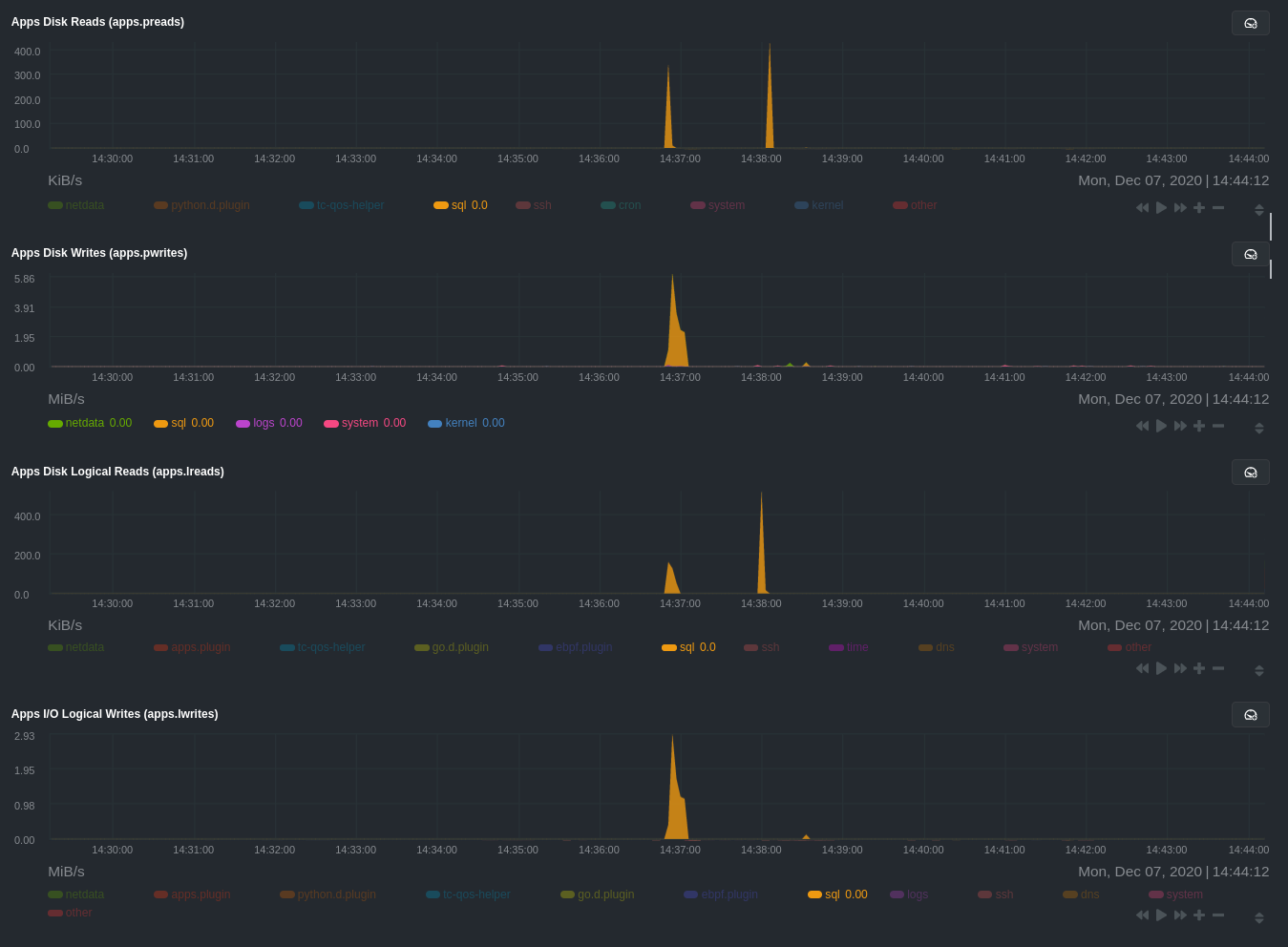
|
|
|
|
> 💡 Click on any dimension below a chart in Netdata Cloud (or to the right of a chart on a local Agent dashboard), to
|
|
> visualize only that dimension. This can be particularly useful in process monitoring to separate one process'
|
|
> utilization from the rest of the system.
|
|
|
|
### Using Netdata's eBPF collector (`ebpf.plugin`)
|
|
|
|
Netdata's eBPF collector puts its charts in two places. Of most importance to process monitoring are the **ebpf file**,
|
|
**ebpf syscall**, **ebpf process**, and **ebpf net** sub-sections under **Applications**, shown in the above screenshot.
|
|
|
|
For example, running the above workload shows the entire "story" how MySQL interacts with the Linux kernel to open
|
|
processes/threads to handle a large number of SQL queries, then subsequently close the tasks as each query returns the
|
|
relevant data.
|
|
|
|
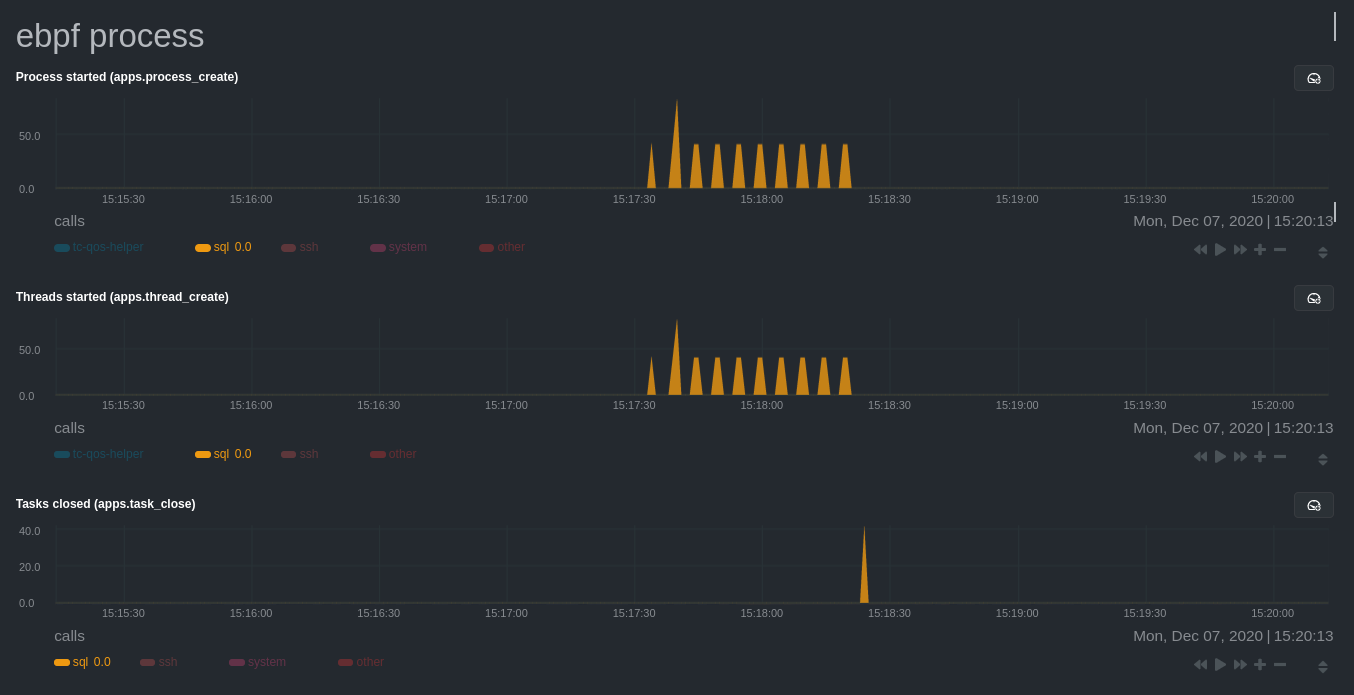
|
|
|
|
`ebpf.plugin` visualizes additional eBPF metrics, which are system-wide and not per-process, under the **eBPF** section.
|
|
|
|
## What's next?
|
|
|
|
Now that you have `apps_groups.conf` configured correctly, and know where to find per-process visualizations throughout
|
|
Netdata's ecosystem, you can precisely monitor the health and performance of any process on your node using per-second
|
|
metrics.
|
|
|
|
For even more in-depth troubleshooting, see our guide on [monitoring and debugging applications with
|
|
eBPF](/docs/guides/troubleshoot/monitor-debug-applications-ebpf.md).
|
|
|
|
If the process you're monitoring also has a [supported collector](/collectors/COLLECTORS.md), now is a great time to set
|
|
that up if it wasn't autodetected. With both process utilization and application-specific metrics, you should have every
|
|
piece of data needed to discover the root cause of an incident. See our [collector
|
|
setup](/docs/collect/enable-configure.md) doc for details.
|
|
|
|
[Create new dashboards](/docs/visualize/create-dashboards.md) in Netdata Cloud using charts from `apps.plugin`,
|
|
`ebpf.plugin`, and application-specific collectors to build targeted dashboards for monitoring key processes across your
|
|
infrastructure.
|
|
|
|
Try running [Metric Correlations](https://learn.netdata.cloud/docs/cloud/insights/metric-correlations) on a node that's
|
|
running the process(es) you're monitoring. Even if nothing is going wrong at the moment, Netdata Cloud's embedded
|
|
intelligence helps you better understand how a MySQL database, for example, might influence a system's volume of memory
|
|
page faults. And when an incident is afoot, use Metric Correlations to reduce mean time to resolution (MTTR) and
|
|
cognitive load.
|
|
|
|
If you want more specific metrics from your custom application, check out Netdata's [statsd
|
|
support](/collectors/statsd.plugin/README.md). With statd, you can send detailed metrics from your application to
|
|
Netdata and visualize them with per-second granularity. Netdata's statsd collector works with dozens of [statsd server
|
|
implementations](https://github.com/etsy/statsd/wiki#client-implementations), which work with most application
|
|
frameworks.
|
|
|
|
### Related reference documentation
|
|
|
|
- [Netdata Agent · `apps.plugin`](/collectors/apps.plugin/README.md)
|
|
- [Netdata Agent · `ebpf.plugin`](/collectors/ebpf.plugin/README.md)
|
|
- [Netdata Agent · Dashboards](/web/README.md#dimensions)
|
|
- [Netdata Agent · MySQL collector](https://learn.netdata.cloud/docs/agent/collectors/go.d.plugin/modules/mysql)
|
|
|
|
[](<>)
|